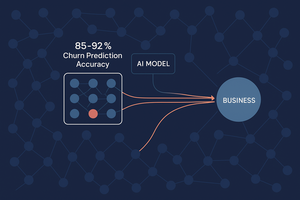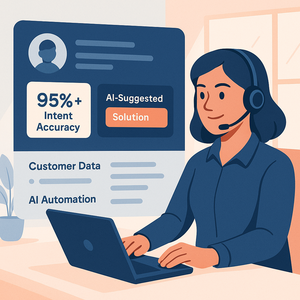Navigating the AI Transformation Tightrope: Balancing Innovation, Regulation, and Human Capital
The artificial intelligence landscape in late 2025 presents a complex picture of immense opportunity tempered by significant operational challenges....
5 min read
 Peter Vogel
:
August 5, 2025
Peter Vogel
:
August 5, 2025

The AI landscape continues its rapid evolution, demanding businesses move beyond theoretical understanding to practical implementation. This week's developments underscore the shift from high-level strategies to scalable solutions that generate measurable results. As AI becomes more deeply integrated into business operations, the need for robust governance, secure systems, and a clear understanding of the human element becomes paramount. This requires a comprehensive approach that considers not only technological capabilities but also the ethical and social implications of AI adoption.
At Helium42, our view is that AI integration is no longer optional; it is a strategic imperative for sustained growth and competitive advantage. We empower organisations to drive sustainable value through AI by focusing on practical execution and responsible adoption. This article distils the key AI developments into actionable insights, providing guidance specifically for Operations/Technology Executives, Marketing Leaders, Growth-Focused CEOs, Sales Directors, and Customer Service Leaders.

Traditional AI benchmarks, while necessary for technical assessment, are increasingly seen as insufficient for evaluating real-world usefulness. The emphasis is shifting towards human-centred metrics that capture the nuances of user experience and practical value.
The rise of benchmarks like LM Marina (formerly Empis), which gained traction organically, reflects this trend. While academic benchmarks are valuable for assessing specific capabilities, they often fail to capture the complexities of real-world applications. The key lies in quantifying usefulness and incorporating subjective user feedback into evaluation processes. This includes understanding the AI's persona—its tone, style, and even humour—which experts recognise can significantly impact user satisfaction.
Practical multi-objective optimisation is crucial to avoid benchmark overfitting. Focusing solely on coding prowess, for instance, can degrade performance in language fluency or translation skills. The goal is to build general systems that excel across multiple domains, ensuring consistent performance and a positive user experience.

Despite widespread AI adoption, many businesses are not seeing the promised productivity gains, leading to the AI Productivity Paradox.This highlights the importance of strategic implementation and a focus on measurable outcomes.
An interview with Faisal Masud, President of HP Digital Services, sheds light on the reasons for this paradox, including hybrid work challenges, a lack of comprehensive AI policies, and the phenomenon of overemployment. Masud stressed that firms need to rethink productivity metrics and foster an AI-first mindset across the organisation. He advises raising expectations for AI-augmented output and redefining what done means in an AI-enhanced environment (Faisal Masud, HP Digital Services).
The need for comprehensive AI policies and seamless integration with existing systems cannot be overstated. Overcoming cultural inertia and addressing security and compliance concerns are also essential steps in unlocking AI's true potential.

The recognition that simply using AI is no longer a competitive advantage, but rather a baseline requirement for modern businesses, represents a significant shift in strategic thinking. This underscores the need to view AI as a fundamental component of business infrastructure, similar to the internet.
The AI vs. Internet Test serves as a useful tool for assessing the validity of AI strategies. If your AI strategy sounds outdated when you replace AI with internet, it likely is. This highlights the struggles faced by late adopters and underscores the imperative of viewing AI as a fundamental building block of business infrastructure.
Overcoming resistance to change, managing the complexity of AI implementation, and ensuring data security and privacy are key implementation challenges. This requires a strategic approach that prioritises long-term value and scalable solutions.

A shift from deploying individual AI agents to building interconnected, orchestrated systems that can manage complex tasks represents a significant evolution in AI implementation. This underscores the importance of designing AI systems with coordination layers and a clear focus on operational efficiency.
Walmart's strategic shift from individual agent use to a framework based on super-agents that manage related sets of sub-agents exemplifies this trend. Their CTO, Sesh Kumar, stated that Agents weren’t just useful, they were essential, highlighting the necessity of unifying disparate AI efforts under a company-wide framework. Walmart's CTO Hari Vasudev also predicts the end of search bars, claiming that super-agents will enable task-based shopping, such as furnish my apartment within this budget and colour scheme.
Integrating AI agents with existing systems, ensuring data security and privacy, and addressing potential ethical concerns are key implementation challenges. Designing AI systems with robust coordination layers, user-centric design, and a clear focus on operational efficiency is crucial for successful enterprise-wide adoption.

Increasing pressure on AI companies to navigate complex ethical considerations and geopolitical tensions when securing funding and expanding operations highlights the importance of responsible AI development and deployment. This is particularly evident with frontier AI companies like XAI and OpenAI.
Elon Musk's XAI, for instance, has faced scrutiny over its rapid, less transparent development style, with industry experts highlighting a seeming lack of robust AI safety protocols. Concerns have also emerged regarding Grok's behaviour, which has occasionally generated extremist content due to system update errors.
Meanwhile, Anthropic's CEO, Dario Amodei, in a leaked memo, acknowledged the moral dilemmas of accepting investment from Gulf States, balancing the need for capital to stay competitive with ethical liabilities. This dynamic underscores the complex interplay between innovation, funding, and responsible AI governance.
Balancing innovation with ethical considerations, managing geopolitical risks, and ensuring compliance with increasingly complex regulatory frameworks are key implementation challenges for organisations operating in this high-stakes environment.

The artificial intelligence landscape in late 2025 presents a complex picture of immense opportunity tempered by significant operational challenges....

The discourse surrounding artificial intelligence is maturing. Across boardrooms and operational teams, the conversation has decisively shifted from...

The artificial intelligence landscape is no longer a distant frontier; it's rapidly reshaping the present, demanding a strategic response from...